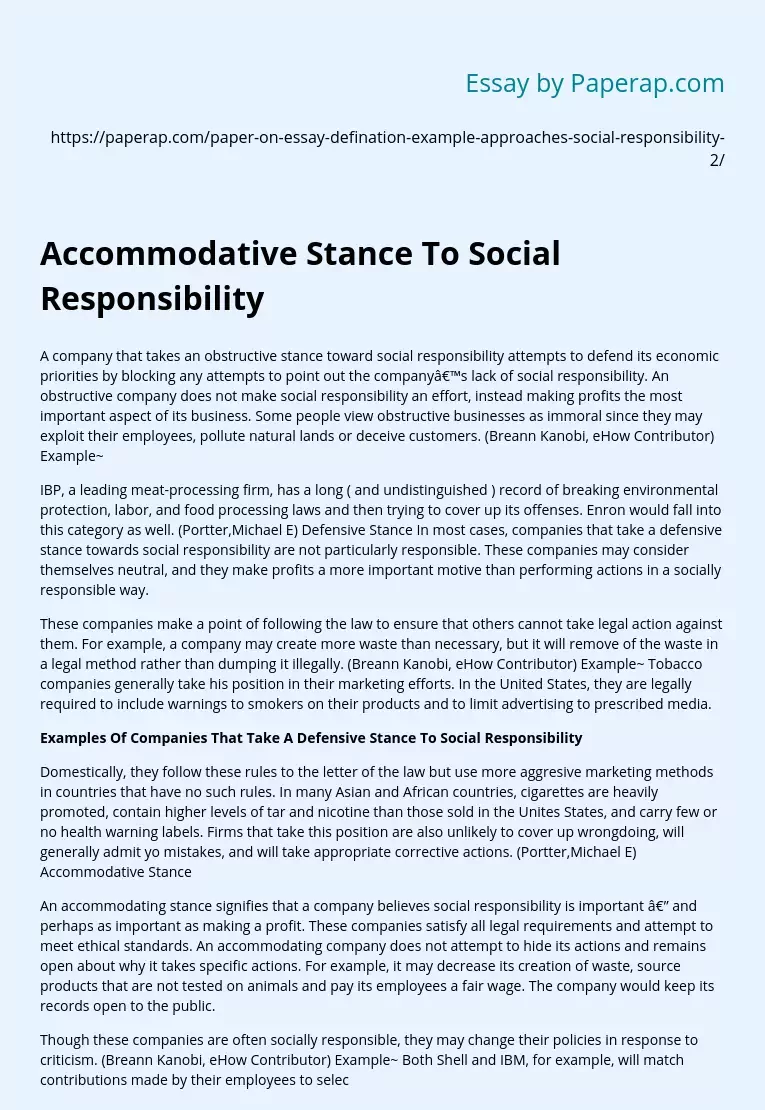Accommodative Stance To Social Responsibility
A company that takes an obstructive stance toward social responsibility attempts to defend its economic priorities by blocking any attempts to point out the company’s lack of social responsibility. An obstructive company does not make social responsibility an effort, instead making profits the most important aspect of its business. Some people view obstructive businesses as immoral since they may exploit their employees, pollute natural lands or deceive customers. (Breann Kanobi, eHow Contributor) Example~
IBP, a leading meat-processing firm, has a long ( and undistinguished ) record of breaking environmental protection, labor, and food processing laws and then trying to cover up its offenses.
Enron would fall into this category as well. (Portter,Michael E) Defensive Stance In most cases, companies that take a defensive stance towards social responsibility are not particularly responsible. These companies may consider themselves neutral, and they make profits a more important motive than performing actions in a socially responsible way.
These companies make a point of following the law to ensure that others cannot take legal action against them.
For example, a company may create more waste than necessary, but it will remove of the waste in a legal method rather than dumping it illegally. (Breann Kanobi, eHow Contributor) Example~ Tobacco companies generally take his position in their marketing efforts. In the United States, they are legally required to include warnings to smokers on their products and to limit advertising to prescribed media.
Examples Of Companies That Take A Defensive Stance To Social Responsibility
Domestically, they follow these rules to the letter of the law but use more aggresive marketing methods in countries that have no such rules.
In many Asian and African countries, cigarettes are heavily promoted, contain higher levels of tar and nicotine than those sold in the Unites States, and carry few or no health warning labels. Firms that take this position are also unlikely to cover up wrongdoing, will generally admit yo mistakes, and will take appropriate corrective actions. (Portter,Michael E) Accommodative Stance
An accommodating stance signifies that a company believes social responsibility is important — and perhaps as important as making a profit. These companies satisfy all legal requirements and attempt to meet ethical standards. An accommodating company does not attempt to hide its actions and remains open about why it takes specific actions. For example, it may decrease its creation of waste, source products that are not tested on animals and pay its employees a fair wage. The company would keep its records open to the public.
Though these companies are often socially responsible, they may change their policies in response to criticism. (Breann Kanobi, eHow Contributor) Example~ Both Shell and IBM, for example, will match contributions made by their employees to selected charitable causes. Many organizations respond to requests for donations to Little League, Girl Scouts, youth soccer programs, and so forth. The point is, however, do not necessarily or proactively seek avenues for contributing. (Portter,Michael E) Proactive Stance Like an accommodating company, a proactive company makes social responsibility a priority.
Instead of reacting to criticism, a proactive company attempts to remain ahead of the curve when it comes to social responsibility. It may make ethics part of its mission statement and attempt to avoid any harm to the environment or its employees. A proactive company may go out of its way to institute new recycling programs, give all of its employees a living wage and benefits, and donate a portion of its profits to charity. (Breann Kanobi, eHow Contributor) Example~ The Toro Company, Exmark Manufacturing and Dixon Industries Inc. ollectively recalled 62,000 faulty commercial riding mowers. These companies worked directly with their dealers, distributors and customers during the recall campaign to proactively fix or replace the affected units already on the market. Nike is another example of a company that took a proactive stance, responding to criticisms about the labor conditions in the company? s supply chain. Kingfisher, a company that owns the British chain B&Q, has successfully implemented a proactive stance on waste reduction, chemicals and green issues. (Brian Bass, Demand Media)
Accommodative Stance To Social Responsibility. (2019, Dec 05). Retrieved from https://paperap.com/paper-on-essay-defination-example-approaches-social-responsibility-2/

